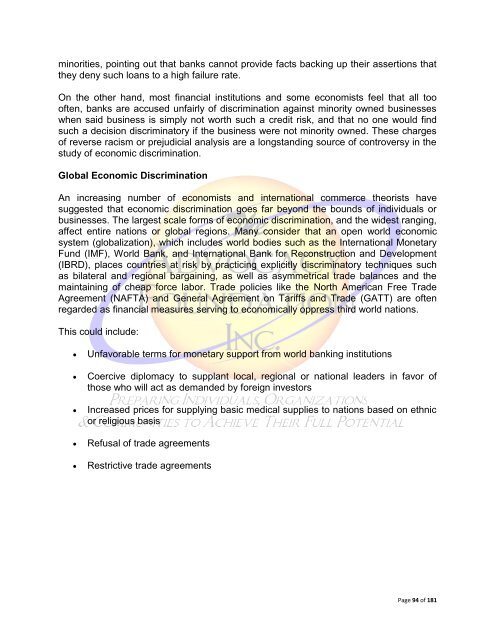You also want an ePaper? Increase the reach of your titles
YUMPU automatically turns print PDFs into web optimized ePapers that Google loves.
minorities, pointing out that banks cannot provide facts backing up their assertions that<br />
they deny such loans to a high failure rate.<br />
On the other hand, most financial institutions and some economists feel that all too<br />
often, banks are accused unfairly of discrimination against minority owned businesses<br />
when said business is simply not worth such a credit risk, and that no one would find<br />
such a decision discriminatory if the business were not minority owned. These charges<br />
of reverse racism or prejudicial analysis are a longstanding source of controversy in the<br />
study of economic discrimination.<br />
Global Economic Discrimination<br />
An increasing number of economists and international commerce theorists have<br />
suggested that economic discrimination goes far beyond the bounds of individuals or<br />
businesses. The largest scale forms of economic discrimination, and the widest ranging,<br />
affect entire nations or global regions. Many consider that an open world economic<br />
system (globalization), which includes world bodies such as the International Monetary<br />
Fund (IMF), World Bank, and International Bank for Reconstruction and Development<br />
(IBRD), places countries at risk by practicing explicitly discriminatory techniques such<br />
as bilateral and regional bargaining, as well as asymmetrical trade balances and the<br />
maintaining of cheap force labor. Trade policies like the North American Free Trade<br />
Agreement (NAFTA) and General Agreement on Tariffs and Trade (GATT) are often<br />
regarded as financial measures serving to economically oppress third world nations.<br />
This could include:<br />
<br />
<br />
<br />
<br />
<br />
Unfavorable terms for monetary support from world banking institutions<br />
Coercive diplomacy to supplant local, regional or national leaders in favor of<br />
those who will act as demanded by foreign investors<br />
Increased prices for supplying basic medical supplies to nations based on ethnic<br />
or religious basis<br />
Refusal of trade agreements<br />
Restrictive trade agreements<br />
Page 94 of 181

















